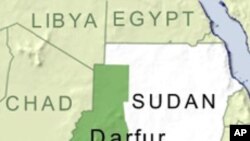The U.S. Congress got an update Thursday on the Obama administration’s policy on Sudan.
The House Subcommittee on Africa heard testimony on the progress being made to end the crisis in Darfur and ensure the Comprehensive Peace Agreement (CPA) between north and south Sudan is fully implemented.
However, before testimony began, there was tough talk by members of Congress about the government of Sudanese president Omar al-Bashir. Bashir has been indicted by the International Criminal Court for war crimes and crimes against humanity relating to Darfur. After the arrest warrant was issued, the Sudanese president expelled a dozen humanitarian organizations from the country.
Subcommittee chairman Democratic Congressman Donald Payne said, “I sometimes wonder if we will ever get a just peace in Sudan as long as the al-Bashir regime is in power.”
He says the conflict in Darfur continues and pointed to last year’s burning of the southern Sudanese town of Abyei by government forces. Payne traveled to Abyei and saw the destruction first hand.
“More than 50,000 people were displaced from their homes,” he says.
More criticism of al-Bashir
Among those invited to sit in on the House panel hearing was Republican Senator Sam Brownback, a frequent critic of the Sudanese leader.
“There’s only one instance in the history of the United States when our government acknowledged and declared a genocide at the time it was taking place. That place is Sudan and the genocide declared in 2004 continues,” he says.
What’s more, Brownback says Sudan is a haven for al-Qaida and supports the Ugandan rebel group Lord’s Resistance Army (LRA). He calls the LRA “the most horrific terrorist group in Central Africa today.”
U.S. policy
The main witness at Thursday’s hearing was General Scott Gration, the U.S. special envoy for Sudan. General Gration was asked how the Obama administration policy could be sure that the Sudanese government was taking action to bring peace to Darfur and stability to southern Sudan.
“You put your finger on it in that implementation is the key. Agreements without implementation are really no good,” he says.
Gration says much has been done regarding the 2005 Comprehensive Peace Agreement between the north and south.
“When I took on this job we had 12 areas where we had differences of agreement between the parties. We’ve been able to close on 10 of those 12,” he says.
Differences remain on the census and the referendum on whether south Sudan should become independent.
“When we get agreements, we will turn those agreements into benchmarks. In other words, we have gone through all the decisions and all the agreements…and we’ll turn these into objective statements. Who’s doing it. What they’re doing. When it needs to be done by and what are the performance standards,” he says.
Monitoring progress
“We’re trying to ensure that through the U.N. and through other mechanisms that we’re able to see verifiable, irreversible changes on the ground,” he says.
General Gration says the U.S. philosophy on the matter can be described as “verify, then trust.”
After evaluating the situation in Sudan, he says, the Obama administration will decide whether more pressure or incentives are needed.




